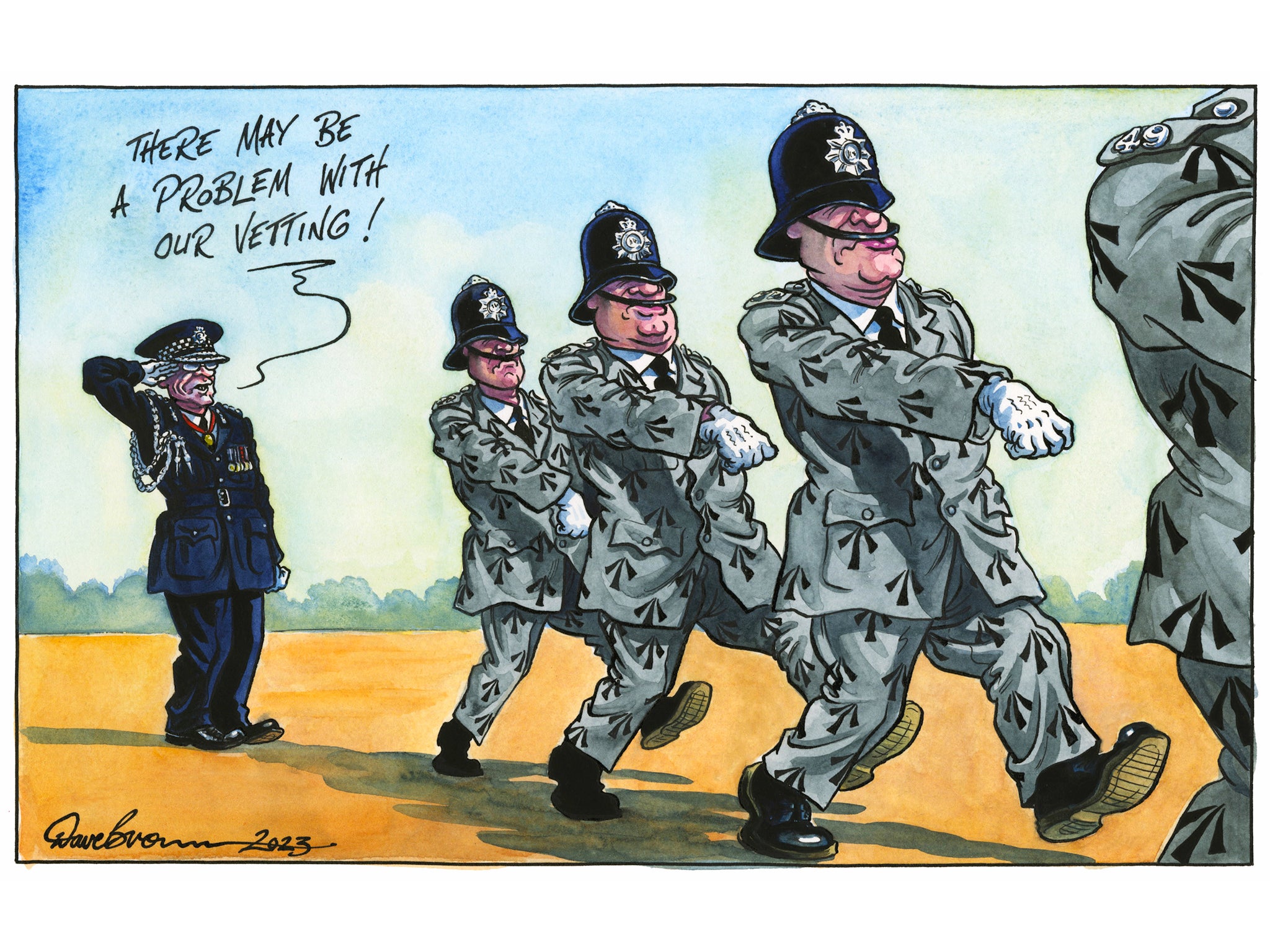Even given the recent appalling cases of police abuse of power, the public lack of confidence in policing is striking.
Polling for The Independent shows that almost half of people distrust policing in the UK in general, and four in 10 would not trust their force to take their issue seriously if they were a victim.
Other recent polls back this point, particularly in London – three-quarters of residents felt officers treated some parts of society differently to others. While almost half of female respondents said they “totally distrusted” the Metropolitan Police following numerous scandals and violent crimes.
A recent international survey of public faith in their police officers puts the UK among the bottom half of countries for confidence in the police. Just two-thirds of the British public who were polled said they had a great deal or quite a lot of confidence in policing, down from 87 per cent on a comparable basis in 1981.
Partly because of the offences committed by Wayne Couzens and David Carrick, among others, policing in the capital no longer carries sufficient public support; but the national picture is also dismal and unacceptable. The focus may be on London, where the recent Casey review painfully chronicled casual and institutional racism, homophobia, misogyny – and basic failures in routine police work. These kinds of complaints have unfortunately echoed down the decades, not least in the 1998 Macpherson report.
However, the issues apply, albeit in varying ways, to forces across the country. Today, from burglaries and antisocial behaviour to cybercrime and the miserable record on grooming gangs and rape convictions, the public simply doesn’t think the police are doing a good enough job at protecting them. That is not a sustainable basis for the rule of law to be upheld.
“Policing by consent” is the oldest and most enduring principle of British policing, dating back to the reforms of Robert Peel in the 19th century; and it is obviously in jeopardy because of this collapse in public confidence. Reforms, particularly in the capital, are urgently needed. The process began with the resignation of Cressida Dick as commissioner of the Metropolitan Police a year ago, at the behest of the mayor of London, Sadiq Khan. As a female chief and popular among her officers, she might have been expected to be in a strong position to lead the force into a better future; but hers was mostly a record of complacency. Now, Sir Mark Rowley has to undertake the long and arduous task of turning the force around.
The encouraging news is that he recognises the need to expel what he estimated last year were hundreds of officers who he suspected fell below the standards expected.
Now, Sir Mark wants to do something about surgically removing the venal, the incompetent and the abusers, and pleads with the government to “give me the powers” to do it. They should do so right away, and extend the powers to every chief constable in the country. If convoluted internal disciplinary procedures are leaving such officers in place, then those need to be abolished. The analogy is with the armed forces, where simple and rapid procedures have to be used to determine culpability and help maintain standards and discipline. The police hold a position of trust and authority in society, and only those well-suited and trained to take their responsibilities seriously should be retained. “The Job” as it’s called is not any old job, and it requires fair but effective HR procedures to rebuild public respect and consent.
Sir Mark, in that context, is right to take the otherwise regrettable step of redeploying 90 officers from serious crime and terrorism to clean up the force, because the wrongdoing that has gone on in the police is hampering them from performing their duties and carrying the consent of the public.
Sir Mark, and other chiefs, might also usefully look at the calibre of people the police have been recruiting during the recent national drive to find 20,000 more officers. Given endemic labour shortages and the great scramble for rookies, there are credible reports that some have not lived up either to their own expectations or those of the force. Commons sense also tells us that recent adverse publicity may have deterred potential female, gay and ethnic minority candidates from stepping forward – a talent pool that needs to be tapped both to make the police more effective and more representative of the communities they purport to serve.
The right people need to be found, especially after tens of thousands of experienced officers in community policing were jettisoned in the Cameron government’s austerity push a decade ago. The “filtering” process for trainee barristers, for example, is far more precise and demanding than that of probationary police officers, and something much closer to “zero tolerance” for past lawbreaking should be introduced. Again, communities need to be reassured that the police they encounter aren’t harbouring secrets or a disturbing past.
Tellingly, Sir Mark has pointed to the past reforming example of Sir Robert Mark as an inspiration. Sir Robert was drafted in by the Labour government in the Sixties to start the process of rooting out a deeply entrenched culture of corruption and cohabitation gangsterism, not least in the old vice and drugs squads, which extended into the higher reaches of the Met itself, which meant that Sir Robert was faced with the fundamental problem of not knowing who to trust even at a senior level.
It was thus, in that respect, probably a more challenging and intricate task than the one Sir Mark is taking on. Yet by infusing the service with a sense of professionalism and pride, and some old-fashioned policing values, Sir Robert cleaned things up and sent some senior officers to jail. The job of reform, in other words, is neither unprecedented nor hopeless, and Sir Mark has at least made a promising start.







Join our commenting forum
Join thought-provoking conversations, follow other Independent readers and see their replies
Comments